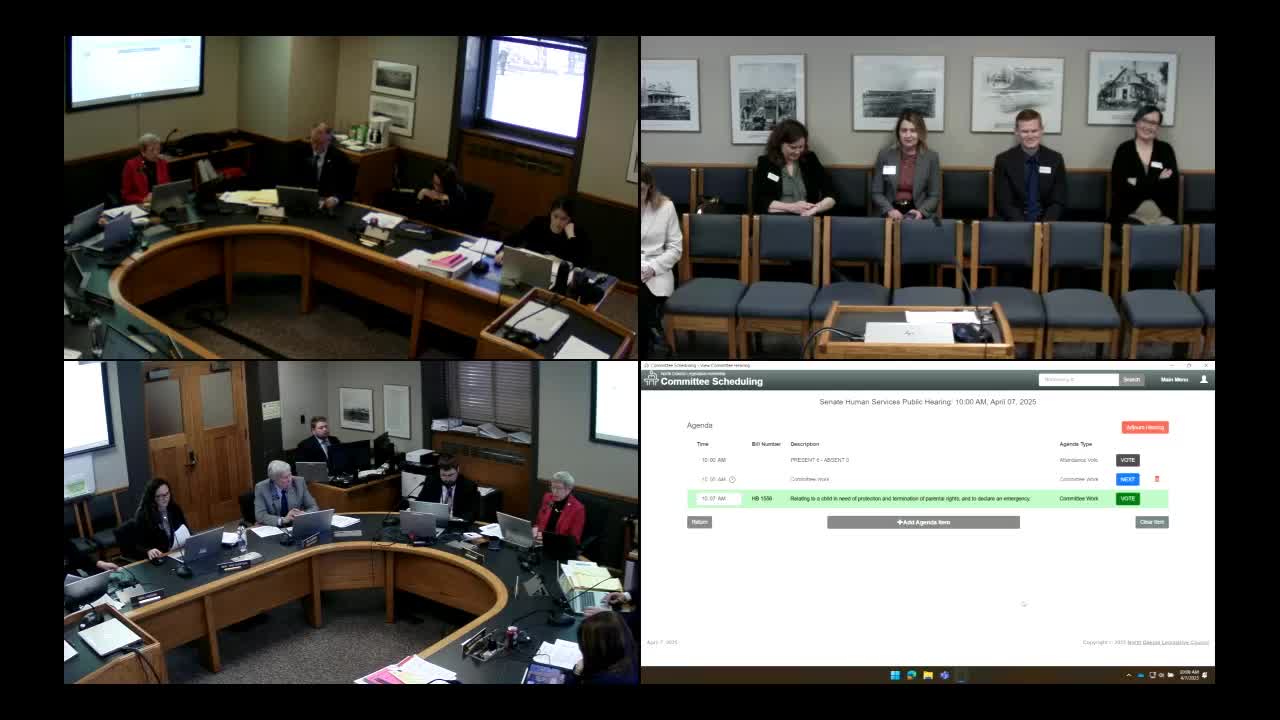Committee amends bill on hard‑to‑place youth, creates Children's Cabinet work group and two‑year sunset
Get AI-powered insights, summaries, and transcripts
Subscribe
Summary
The North Dakota Senate Human Services Committee on a unanimous vote advanced an amended version of Senate Bill 1556 that directs the Children's Cabinet to convene a work group to study out‑of‑home placement for children who intersect the child‑protection and juvenile‑justice systems, and added a sunset date of Aug. 1, 2027.
The North Dakota Senate Human Services Committee on a unanimous vote advanced an amended version of Senate Bill 1556 that directs the Children's Cabinet to convene a small work group to study and recommend solutions for out‑of‑home placement of children who intersect the child‑protection and juvenile‑justice systems.
The committee amended the bill to adopt language proposed by Department counsel and to add a new section establishing an 8–10 person work group that will report every other month to the Children's Cabinet. The amendment also includes a sunset provision for sections 1–3 set to take effect on Aug. 1, 2027. The committee voted 6–0 to adopt the amendment and then voted 6–0 to give the bill a do‑pass as amended recommendation to the floor.
Why it matters: Witnesses and committee members said the amendment is intended to create a forum where juvenile court staff, behavioral‑health providers, zone directors and other stakeholders can design placement options and services so children who require out‑of‑home treatment can get care in community‑based settings when possible.
Committee testimony included a point‑in‑time survey of human service zones conducted by Kim Jacobson of the Agassiz Valley Human Service Zone. Jacobson said that as of April 1, 2025, zones reported 50 youth in zone custody who also had delinquency histories; five of those youth were adjudicated incompetent and the remaining 45 were considered competent. Those 50 youth carried a combined total of 224 legal charges (18 unspecified for timing), an average of about 4.5 charges per youth. Types of charges reported included simple assault (55 counts), criminal mischief (28), disorderly conduct (24), runaway (10) and a range of violent felony and misdemeanor offenses.
"We thought we'd be in the 20s, so that we hit 50 was remarkable to ours," Kim Jacobson said of the survey results. "The magnitude and the complexity surprised even us as custodians."
Senators emphasized that the bill is intended to focus on the child's treatment needs rather than parents' child‑protection issues. Senator Hogan (committee discussion leader) framed the amendment as a collaborative first step: the work group would include juvenile‑court staff and behavioral‑health staff and be assisted by a consultant already working with the Children's Cabinet. "The goal is maybe everybody can sit at the table and contribute what they can contribute so that we don't have one system saying it's your problem and then giving it away," Hogan said.
Several senators raised concerns about codifying current practice into statute. Senator Roers said she is reluctant to remove existing language that some parents must use now to access services, and proposed keeping the original section while adding the work group. Senator Hogan expressed concern that codifying current practice without a plan would force implementation before solutions are developed. As compromise language, the amendment accepted by the committee incorporates Department counsel's drafting on page 2, adds the Children's Cabinet work group as a new section, and places a sunset on the earlier sections.
Formal actions: the committee adopted the amendment (6–0) and then voted to give Senate Bill 1556 a do‑pass as amended recommendation (6–0). Committee members voting aye in the amendment and final votes were Senator Weston, Senator Roers, Senator Hogan, Senator Van Osteen, Senator Clemens and Senator Lee.
Next steps: Committee members indicated Senator Hogan is likely to carry the bill to the full Senate. The amended bill will proceed through the body and, if amended again in the House, likely to conference committee.
Ending: Committee members said the amendment is an initial, collaborative effort rather than a completed policy solution and that the work group is intended to design services and placement options that could reduce reliance on congregate or out‑of‑state placements.
